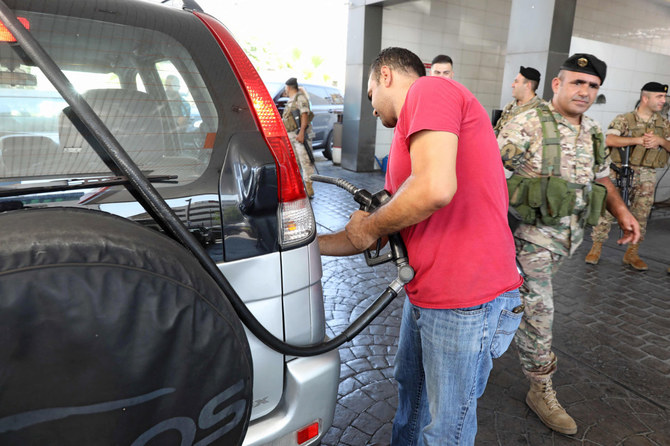
By NAJIA HOUSSARI — arabnews.com — BEIRUT: Lebanon’s army on Saturday seized fuel from petrol pumps to curb hoarding amid crippling shortages. The country is grappling with a financial crisis and foreign currency reserves are fast depleting, while its national currency has lost more than 90 percent of its value on the black market. Traffic in Beirut and other places was low on Saturday, and security forces temporarily closed the northern Aboudiyeh Border Crossing with Syria because of a power generator malfunction. Dozens of institutions surprised their employees with a day of unplanned leave next Monday, while shops and institutions in Beirut’s center were informed they would not be supplied with electricity because of the lack of diesel.
Activists shared a video on social media showing a crowd in the town of Ali Al-Nahri, in the Bekaa Valley, protesting around Hussainia Mosque, where Hezbollah member and former minister Hussein Hajj Hassan was giving a speech. Eyewitnesses told Arab News that around 50 people objected to Hassan going up to the pulpit and speaking. “They called on him to get back, throwing insults at him and saying, ‘We are hungry.’” The MP had to leave the town, shortening his mosque speech, amid a heavy army deployment. Army intelligence on Saturday arrested four of the people who had objected to Hassan’s presence. But they were released due to popular pressure. People objecting to the arrests blocked the road between Ali Al-Nahri and the eastern village of Massa, which is a vital road for Hezbollah. This road helps the party access Syria’s Al-Shaara region, where its military posts are located. Protesters accused Hezbollah of using the town as “a road to smuggle diesel to Syria.”
Moreover, a village resident who was present during Friday’s incident faced arrest today by an unknown party. Hassan Makkhal shared his arrest from his home on Facebook. Makkhal is said to be a critic of the Hezbollah figure.
Another video showed young men surrounding the house of MP Anwar Jomaa, who is a member of Hezbollah’s political wing, in protest against the country’s dire situation. One of the protesters said: “We came to ask him what he is doing for us in light of this crisis. We are not sheep or dogs. He is considered one of us and is not doing anything for us.” Ibrahim Sareini, head of the Syndicate of Tanker Owners, said: “The attacks targeting tankers transporting fuel to bakeries, mills, hospitals and generators in all regions could force the owners of these tankers to stop transporting fuel.”
President Michel Aoun called on parliament to meet and take appropriate action following the Central Bank’s decision to end fuel subsidies, his office said. But the Future Movement criticized Aoun, saying he was implementing the policy put in place by his son-in-law Gebran Bassil. It also warned the president against “continuing to violate the constitution.” Bassil, who heads the Free Patriotic Movement, is an ally of Hezbollah.
Former MP Nadim Gemayel criticized Aoun on Twitter: “No electricity, no diesel, no gasoline, no water, no security and no stability… Michel Aoun, Leave.” The Progressive Socialist Party supported the idea of putting an end to the “charade of senseless subsidies that actually benefit monopolies, monopolists, smuggling and smugglers. It also constitutes a lifeline for the Syrian regime at the expense of the Lebanese people, their money and livelihood.” The fuel crisis has led a top private hospital to say it may have to close due to power shortages, warning this could cause hundreds of deaths. In Lebanon, 78 percent of the population lives below the poverty line.



